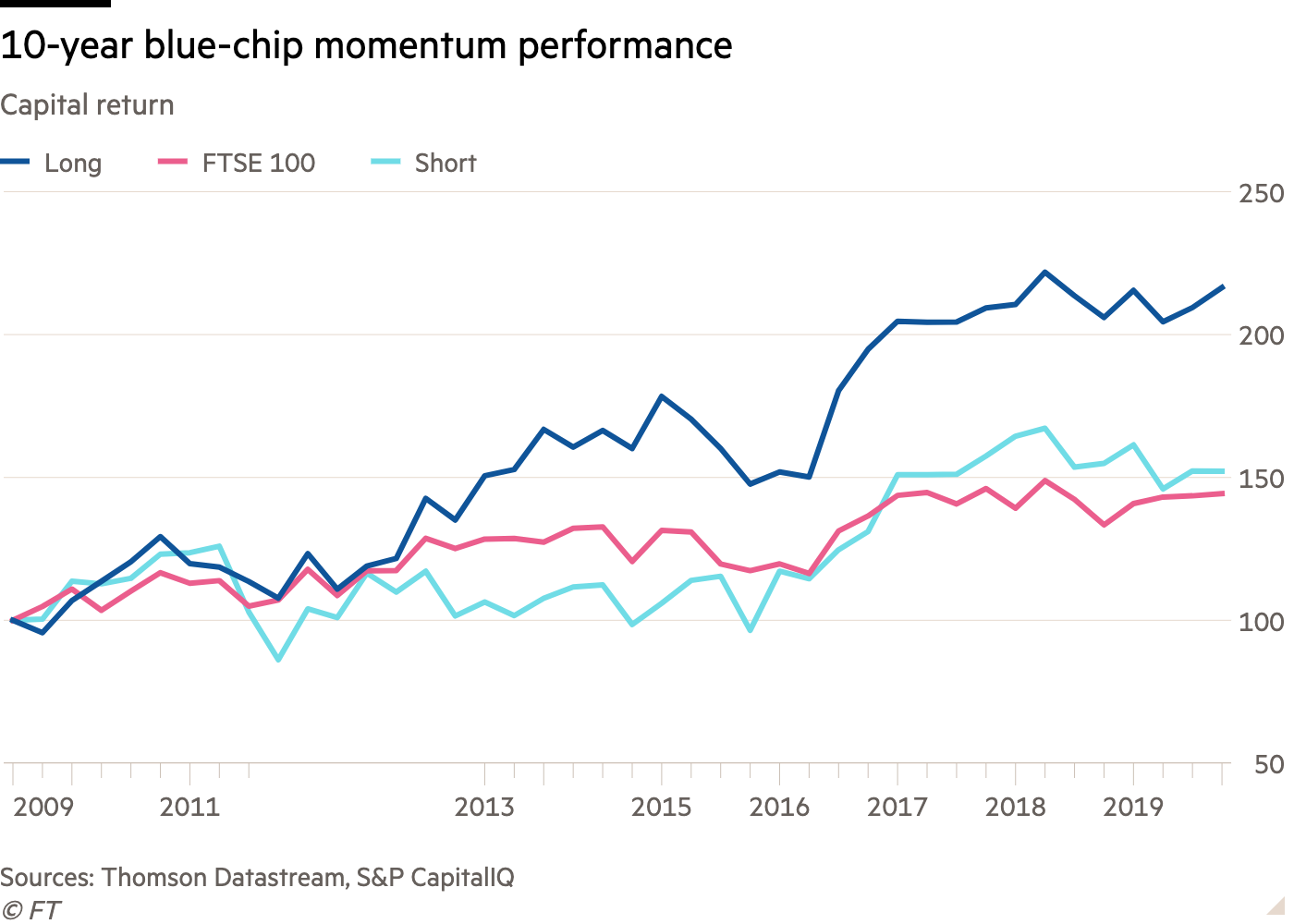My blue-chip momentum screen has enjoyed a solid final quarter of 2019, with the longs (the 10 best-performing shares of the prior three months) registering good outperformance of the FTSE 100 index, while the shorts (the 10 worst-performing shares of the prior three months) have underperformed. But the well-documented momentum phenomenon is something that plays out in the long term rather than over time periods as brief as three months. In fact, 2019 as a whole has been rather disappointing as the longs have underperformed the FTSE 100 on a 12-month basis with a 5.1 per cent capital return compared with 8.0 per cent. The shorts did underperform the index by more, though, dropping 1.8 per cent.
Three months of momentum
| Longs | Shorts | ||
| Name | Capital return (15 Sep - 29 Nov 2019) | Name | Capital return (15 Sep - 29 Nov 2019) |
| London Stock Exchange | -7.9% | Micro Focus | -0.6% |
| Flutter Entertainment | 18% | EVRAZ | -31% |
| NMC Health | -14% | Centrica | 6.0% |
| Vodafone | -4.9% | BT | 13% |
| Burberry | -2.9% | Fresnillo | -22% |
| JD Sports | 6.4% | Sage | 14% |
| Melrose | 11% | Coca-Cola HBC | -0.7% |
| ITV | 16% | Royal Dutch Shell | -2.6% |
| Ashtead | 2.2% | Rio Tinto Group | -3.4% |
| The Berkeley Group | 10% | AVEVA Group plc | 26% |
| Longs | 3.3% | Shorts | -0.1% |
| FTSE 100 | 0.5% | FTSE 100 | 0.5% |
Source: S&P Capital IQ
The second quarter of the year proved particularly painful for the longs as the market moved to rerate shares in high-quality companies but punished lower-quality plays such as the house builders and banks that the momentum portfolio had picked up. More recently this trend has again reversed, with the market shifting towards 'value' plays and especially domestic stocks that could benefit from a resolution to the first-phase of the Brexit saga. The timing of portfolio reshuffles is often key to the fortunes of simple trend-following strategy and overall this more recent shift to value appears to have benefited the performance of the screen.
The long-term performance of the screen’s long picks continues to look impressive, although the shorts, which are meant to underperform, have gone through a noteworthy spell of outperformance of the index too.
Long-term momentum price performance
| Long | Short | FTSE 100 | |
| Since June 2017 | 154% | 15% | 9.8% |
| 10-yr | 116% | 52% | 39.8% |
| 5-yr | 35% | 54% | 19.5% |
| 3-yr | 11% | 16% | 5.6% |
| 1-yr | 5.1% | -1.8% | 8.0% |
Source: S&P CapitalIQ/Thomson Datastream
It’s difficult to point to a very clear theme in the momentum picks for the coming three months. For the longs, property and housebuilders perhaps stand out as a theme as these sectors could be beneficiaries of a conclusion to the first phase of Brexit. There is also a good showing from international travel plays in the form of holiday company TUI and International Consolidated Airlines. Both companies have the potential to benefit from the collapse of Thomas Cook earlier this year. The average yield boasted by the 10 longs is a healthy 4.4 per cent, which can be seen as a reflection of the market’s improved sentiment toward 'value' plays, although this description is definitely not fitting of all of the 10 stocks.
The shorts include two companies hit by the fall in the price of iron ore. Aside from this, there are relatively few common threads. All the longs and shorts can be seen in the tables below, along with some key fundamentals. I’ve also provided brief write-ups of the top three longs.
Blue-chip momentum picks
Longs
| AVEVA | LSE:AVV | 4,558p | £7.3bn | 38.0% | 40 | 0.9% |
| Persimmon | LSE:PSN | 2,558p | £8bn | 28.0% | 9 | 9.2% |
| International Consolidated Airlines | LSE:IAG | 554p | £11.0bn | 28.0% | 6 | 4.8% |
| TUI | LSE:TUI | 1,064p | £7.3bn | 26.1% | - | - |
| Flutter Entertainment | LSE:FLTR | 8,800p | £8.1bn | 24.9% | - | - |
| ITV | LSE:ITV | 145p | £6bn | 23.2% | 11 | 5.5% |
| Rightmove | LSE:RMV | 624p | £5bn | 23.0% | 30 | 1.1% |
| Standard Life Aberdeen | LSE:SLA | 317p | £7bn | 20.0% | 17 | 6.8% |
| Land Securities | LSE:LAND | 958p | £7bn | 20.0% | 17 | 4.8% |
| SEGRO | LSE:SGRO | 894p | £10bn | 19.2% | 35 | 2.1% |
| AVERAGE | - | - | - | 25.0% | 21 | 4.4% |
Shorts
| EVRAZ | LSE:EVR | 370p | £5.4bn | -30.8% | 6 | 25% |
| Pearson | LSE:PSON | 647p | £5bn | -25.3% | 11 | 2.9% |
| Fresnillo | LSE:FRES | 578p | £4.3bn | -23.2% | 24 | 3.7% |
| Imperial Brands | LSE:IMB | 1,703p | £16bn | -19.8% | 6 | 12% |
| Hiscox | LSE:HSX | 1,363p | £3.9bn | -19.7% | 27 | 2.4% |
| Carnival Corporation | LSE:CCL | 3,253p | £31.4bn | -15.1% | - | - |
| NMC Health | LSE:NMC | 2,509p | £5.2bn | -14.2% | 19 | 0.7% |
| Rolls-Royce | LSE:RR. | 712p | £13.7bn | -13.7% | 33 | 1.6% |
| Prudential | LSE:PRU | 1,377p | £35.6bn | -10.5% | 9 | 3.6% |
| Johnson Matthey | LSE:JMAT | 2,874p | £5.5bn | -10.2% | 12 | 3.0% |
| AVERAGE | - | - | - | -18.2% | 16 | 6.1% |
Source: S&P CapitalIQ
Aveva
Industrial software group Aveva (AVV) was only promoted to the blue-chip index in June, but investors appear to be warming to its charms. The company’s software is aimed at improving the design and operational efficiency of industrial assets. This focus fits very well with the global sustainability drive, although about two-fifths of its business is linked to oil and gas capital expenditure.
Demand for Aveva’s software is strong at the moment, which is providing good support as it attempts to reduce revenues from its lower-value services division. The company is also attempting to move clients to software rental contracts and away from purchases of perpetual licences, which come with large up-front payments. Not only should increased revenue from rental contracts improve the reliability of sales, but the experience of rivals suggests that the rental model also substantially increases the absolute level of sales over the long term.
It has therefore been seen as good news that half-year results reported an 81 per cent rise in rental sales and an increase in recurring income from 52 per cent to 62 per cent over 12 months. Perhaps more significant, though, was a jump in the first-half operating margin from 17.7 per cent to 23.1 per cent. The company’s relatively stable costs mean increased sales have the potential to substantially lift profitability. Indeed, while the company has a medium-term operating profit target of 30 per cent, broker Panmure thinks its transformation into a rental-focused software business could see margins ultimately reach 40 to 45 per cent.
While Aveva’s shares are far from cheap, they don’t look too out of whack with the sector and the company has a more enticing margin improvement story than most. That said, should sentiment shift and momentum not hold, the valuation makes the shares look vulnerable.
International Consolidated Airlines
There has been a major shift in sentiment towards airlines over the past quarter. International Consolidated Airlines (IAG) has been a beneficiary. Across the industry, an excess of airline capacity and downward pressure on revenue per seat has led to a scaling back of 2020 expansion plans, which should ultimately help ticket prices. Contributing to this has been the collapse of holiday company Thomas Cook, itself an airline operator, and the grounding of Boeing’s catastrophe-prone Max 737 planes.
Strikes have been an issue for IAG, as they also have for low-cost rival Ryanair. However, the company has been confident enough in its prospects to launch a €1bn bid for Air Europa. The deal would strengthen IAG’s presence in Madrid, as well as making it a market leader on routes between Europe and South America. The company has done well from making cost savings following acquisitions in the past, so the proposed takeover, which IAG hopes to complete in the first half of next year, has generally been well received. But the deal is subject to competition approval.
The recent strong run in IAG shares comes following a period of serious weakness. As such, the valuation still looks relatively attractive. Cost increases are expected across the industry next year, which could temper enthusiasm in the coming quarter.
Persimmon
The fortunes of the housebuilding sector since the credit crunch have owed much to political manoeuvres, as well as the all-important economic cycle. That’s because the Help to Buy incentive scheme has, in particular, richly rewarded housebuilders.
With polls suggesting a Boris Johnson-led Conservative majority government as the most likely outcome of the 12 December general election, the chances are that housebuilders could well continue to benefit from industry-friendly policies. What’s more, the potential for a Conservative majority to deliver a deal on the first phase of Brexit may also benefit housing transaction levels. Transactions have recently been in the doldrums, which is normal at times of heightened political uncertainty and elections.
The ascent of Persimmon’s (PSN) shares over the past three months also owes its strength to the fact the shares lost over a quarter of their value from their March highs to mid-August lows. The share price weakness during this time was not without cause. As well as suggestions of a tougher regulatory environment, rising build costs and limited price inflation mean margins have been under pressure. What’s more, in order to address issues with build quality the company has decided to slow sales and is also allowing customers to temporarily hold back 1.5 per cent of house purchase prices to deal with snags.
The shares are now back above their March highs, but if the election result matches current expectations, there may be further to go.












